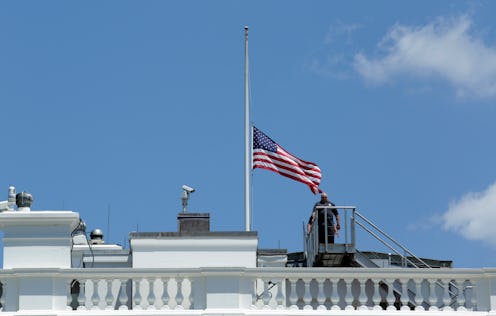Update: In a press conference Monday morning, Orlando police confirmed that 49 people had been killed and 53 injured early Sunday morning at Orlando's Pulse gay nightclub in the deadliest mass shooting in recent U.S. history. After opening fire on the crowd, an individual named Omar Mateen had taken hostages and was ultimately killed in a stand-off with police; Mateen had called 911 and pledged allegiance to the Islamic State shortly before the massacre. Orlando mayor Buddy Dyer declared a state of emergency, and the massacre is being investigated as an act of terrorism.
The victims' names were released by the city of Orlando on its website as their next of kin were informed. Here are some ways to help the Orlando shooting victims and their loved ones; you can also donate to the victims' fund, as well as express your solidarity with the LGBTQ community by posting a tribute online. You can also attend a vigil near you to honor the victims.
Earlier: On Sunday morning, Americans woke up to news of yet another tragedy. A shooting at Orlando's gay nightclub, Pulse, left 50 people dead and more than 50 in the hospital. This incident has been declared the biggest mass shooting in U.S. history. Let that statement sink in: the biggest mass shooting in our entire country's history. Unsurprisingly, the shooting resulted in a call for stricter gun control. Yet anytime the topic arises, there's a common counterargument. "What about criminals? Won't they get their hands on guns anyway? There's no point." Well, thanks to one Twitter user, there's now a perfect response to such arguments. Judd Legum, the editor-in-chief of ThinkProgress, tweeted:
Gun laws are pointless because criminals will still get guns
Stop lights are pointless because criminals will still run red lights
Legum's response is such a mic drop. He draws an analogy that is so straightforward, it's almost dumbfounding. Hopefully comparing gun laws to stoplights (widely viewed as a societal necessity) will make people think of these policies in a different light. I frequently find myself frustrated by people's misconception that stricter gun laws are taking away their Second Amendment rights, so I'm glad Legum articulated a point I've wanted to make in the past, but couldn't find the right words.
The goal of gun control is to strengthen protocol, in the hopes that guns don't wind up in the hands of people who have a history of crimes or mental illness. Makes sense, right? But unfortunately, people are so quick to think their rights are violated that they let this notion impede their ability to foresee actual positive changes such laws can bring. No one is trying to take away all guns; the point is to be more cautious of who can obtain them. After all, 56 of the last 71 shootings in the U.S. since 1982 utilized legally purchased guns.
With gun laws and stoplights, these are safety measures that aim to protect people. Of course, in both instances there will always be rule breakers. There are people who speed through red lights. And yes, I'm not naive enough to think there won't be people who get their hands on guns illegally. Still, let's revisit that statistic: 56/71 shootings happened with legal weapons. I believe that for both gun laws and stoplights, if these regulation save any lives, it's worth it. The few rule breakers shouldn't set the tone for the majority. What kind of world would it be if society removed stoplights, since some people drive through them anyway? If I had to guess, no one would ever approve that policy. It'd be beneficial to think of gun laws in a similar vein.
Next time someone tries to make the "criminals will get guns anyway" argument, I'll most likely borrow Legum's response. And if you want to spark change yourself, check out this list of ways you can help fight for stronger gun control. Because really, enough is enough.
Image: Bustle
